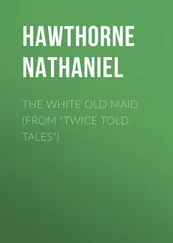“I don’t hear anybody in the house,” said one of the children to another. “The monkey won’t pick up anything here.”
“There is somebody at home,” affirmed the urchin on the threshold. “I heard a step!”
Still the young Italian’s eye turned sidelong upward; and it really seemed as if the touch of genuine, though slight and almost playful, emotion communicated a juicier sweetness to the dry, mechanical process of his minstrelsy. These wanderers are readily responsive to any natural kindness — be it no more than a smile, or a word itself not understood, but only a warmth in it — which befalls them on the roadside of life. They remember these things, because they are the little enchantments which, for the instant, — for the space that reflects a landscape in a soap-bubble, — build up a home about them. Therefore, the Italian boy would not be discouraged by the heavy silence with which the old house seemed resolute to clog the vivacity of his instrument. He persisted in his melodious appeals; he still looked upward, trusting that his dark, alien countenance would soon be brightened by Phoebe’s sunny aspect. Neither could he be willing to depart without again beholding Clifford, whose sensibility, like Phoebe’s smile, had talked a kind of heart’s language to the foreigner. He repeated all his music over and over again, until his auditors were getting weary. So were the little wooden people in his show-box, and the monkey most of all. There was no response, save the singing of the locust.
“No children live in this house,” said a schoolboy, at last. “Nobody lives here but an old maid and an old man. You’ll get nothing here! Why don’t you go along?”
“You fool, you, why do you tell him?” whispered a shrewd little Yankee, caring nothing for the music, but a good deal for the cheap rate at which it was had. “Let him play as he likes! If there’s nobody to pay him, that’s his own lookout!”
Once more, however, the Italian ran over his round of melodies. To the common observer — who could understand nothing of the case, except the music and the sunshine on the hither side of the door — it might have been amusing to watch the pertinacity of the street-performer. Will he succeed at last? Will that stubborn door be suddenly flung open? Will a group of joyous children, the young ones of the house, come dancing, shouting, laughing, into the open air, and cluster round the show-box, looking with eager merriment at the puppets, and tossing each a copper for long-tailed Mammon, the monkey, to pick up?
But to us, who know the inner heart of the Seven Gables as well as its exterior face, there is a ghastly effect in this repetition of light popular tunes at its doorstep. It would be an ugly business, indeed, if Judge Pyncheon (who would not have cared a fig for Paganini’s fiddle in his most harmonious mood) should make his appearance at the door, with a bloody shirt-bosom, and a grim frown on his swarthily white visage, and motion the foreign vagabond away! Was ever before such a grinding out of jigs and waltzes, where nobody was in the cue to dance? Yes, very often. This contrast, or intermingling of tragedy with mirth, happens daily, hourly, momently. The gloomy and desolate old house, deserted of life, and with awful Death sitting sternly in its solitude, was the emblem of many a human heart, which, nevertheless, is compelled to hear the thrill and echo of the world’s gayety around it.
Before the conclusion of the Italian’s performance, a couple of men happened to be passing, On their way to dinner. “I say, you young French fellow!” called out one of them, — ”come away from that doorstep, and go somewhere else with your nonsense! The Pyncheon family live there; and they are in great trouble, just about this time. They don’t feel musical to-day. It is reported all over town that Judge Pyncheon, who owns the house, has been murdered; and the city marshal is going to look into the matter. So be off with you, at once!”
As the Italian shouldered his hurdy-gurdy, he saw on the doorstep a card, which had been covered, all the morning, by the newspaper that the carrier had flung upon it, but was now shuffled into sight. He picked it up, and perceiving something written in pencil, gave it to the man to read. In fact, it was an engraved card of Judge Pyncheon’s with certain pencilled memoranda on the back, referring to various businesses which it had been his purpose to transact during the preceding day. It formed a prospective epitome of the day’s history; only that affairs had not turned out altogether in accordance with the programme. The card must have been lost from the Judge’s vest-pocket in his preliminary attempt to gain access by the main entrance of the house. Though well soaked with rain, it was still partially legible.
“Look here; Dixey!” cried the man. “This has something to do with Judge Pyncheon. See! — here’s his name printed on it; and here, I suppose, is some of his handwriting.”
“Let’s go to the city marshal with it!” said Dixey. “It may give him just the clew he wants. After all,” whispered he in his companion’s ear, “it would be no wonder if the Judge has gone into that door and never come out again! A certain cousin of his may have been at his old tricks. And Old Maid Pyncheon having got herself in debt by the cent-shop, — and the Judge’s pocketbook being well filled, — and bad blood amongst them already! Put all these things together and see what they make!”
“Hush, hush!” whispered the other. “It seems like a sin to be the first to speak of such a thing. But I think, with you, that we had better go to the city marshal.”
“Yes, yes!” said Dixey. “Well! — I always said there was something devilish in that woman’s scowl!”
The men wheeled about, accordingly, and retraced their steps up the street. The Italian, also, made the best of his way off, with a parting glance up at the arched window. As for the children, they took to their heels, with one accord, and scampered as if some giant or ogre were in pursuit, until, at a good distance from the house, they stopped as suddenly and simultaneously as they had set out. Their susceptible nerves took an indefinite alarm from what they had overheard. Looking back at the grotesque peaks and shadowy angles of the old mansion, they fancied a gloom diffused about it which no brightness of the sunshine could dispel. An imaginary Hepzibah scowled and shook her finger at them, from several windows at the same moment. An imaginary Clifford — for (and it would have deeply wounded him to know it) he had always been a horror to these small people — stood behind the unreal Hepzibah, making awful gestures, in a faded dressing-gown. Children are even more apt, if possible, than grown people, to catch the contagion of a panic terror. For the rest of the day, the more timid went whole streets about, for the sake of avoiding the Seven Gables; while the bolder signalized their hardihood by challenging their comrades to race past the mansion at full speed.
It could not have been more than half an hour after the disappearance of the Italian boy, with his unseasonable melodies, when a cab drove down the street. It stopped beneath the Pyncheon Elm; the cabman took a trunk, a canvas bag, and a bandbox, from the top of his vehicle, and deposited them on the doorstep of the old house; a straw bonnet, and then the pretty figure of a young girl, came into view from the interior of the cab. It was Phoebe! Though not altogether so blooming as when she first tripped into our story, — for, in the few intervening weeks, her experiences had made her graver, more womanly, and deeper-eyed, in token of a heart that had begun to suspect its depths, — still there was the quiet glow of natural sunshine over her. Neither had she forfeited her proper gift of making things look real, rather than fantastic, within her sphere. Yet we feel it to be a questionable venture, even for Phoebe, at this juncture, to cross the threshold of the Seven Gables. Is her healthful presence potent enough to chase away the crowd of pale, hideous, and sinful phantoms, that have gained admittance there since her departure? Or will she, likewise, fade, sicken, sadden, and grow into deformity, and be only another pallid phantom, to glide noiselessly up and down the stairs, and affright children as she pauses at the window?
Читать дальше












